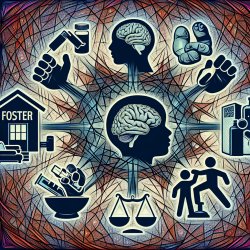The intricate relationship between traumatic brain injury (TBI), substance abuse, adverse childhood events (ACE), and aggression levels in individuals with a history of foster care is a critical area of study. Recent research by Cusimano et al. (2020) sheds light on these complex interactions and provides valuable insights for practitioners working with this vulnerable population.
Key Findings from the Research
The study found that individuals with a history of foster care have a significantly higher prevalence of TBI, substance use disorders, alcohol use disorders, and adverse childhood events compared to their peers. Notably, 65% of foster participants reported a history of TBI, which is considerably higher than the general population's prevalence.
The research also highlighted that foster participants exhibited higher levels of aggression compared to controls. However, no significant differences were found in brain volumes between the two groups, suggesting that other factors may contribute more significantly to these outcomes.
Implications for Practitioners
Practitioners working with foster children can leverage these findings to enhance their interventions. Here are some actionable strategies:
- Comprehensive Assessment: Implement thorough assessments that include screening for TBI, substance use disorders, and ACEs. Understanding the full scope of a child's experiences can inform more tailored interventions.
- Integrated Support Services: Develop multi-dimensional support programs that address mental health, substance use, and behavioral issues simultaneously. Given the complex interplay of these factors, integrated approaches are likely to be more effective.
- Focus on Early Intervention: Early identification and intervention for children at risk of TBI or those who have experienced ACEs can mitigate long-term negative outcomes. Programs should aim to provide support before issues escalate.
- Family Involvement: Consider involving family members in intervention programs. This approach acknowledges the potential for foster children to return to their biological families and helps create a supportive environment.
Encouraging Further Research
The study by Cusimano et al. opens several avenues for further research. Future studies could explore larger sample sizes and investigate the temporal sequences of events leading to adverse outcomes. Additionally, examining genetic factors alongside environmental influences could provide deeper insights into the nature versus nurture debate in this context.
Conclusion
The findings underscore the need for comprehensive support systems for individuals with a history of foster care. By understanding the complex web of interactions between TBI, substance abuse, ACEs, and aggression, practitioners can develop more effective interventions that address the unique needs of this population.
To read the original research paper, please follow this link: Associations between Traumatic Brain Injury, Drug Abuse, Alcohol Use, Adverse Childhood Events, and Aggression Levels in Individuals with Foster Care History.










